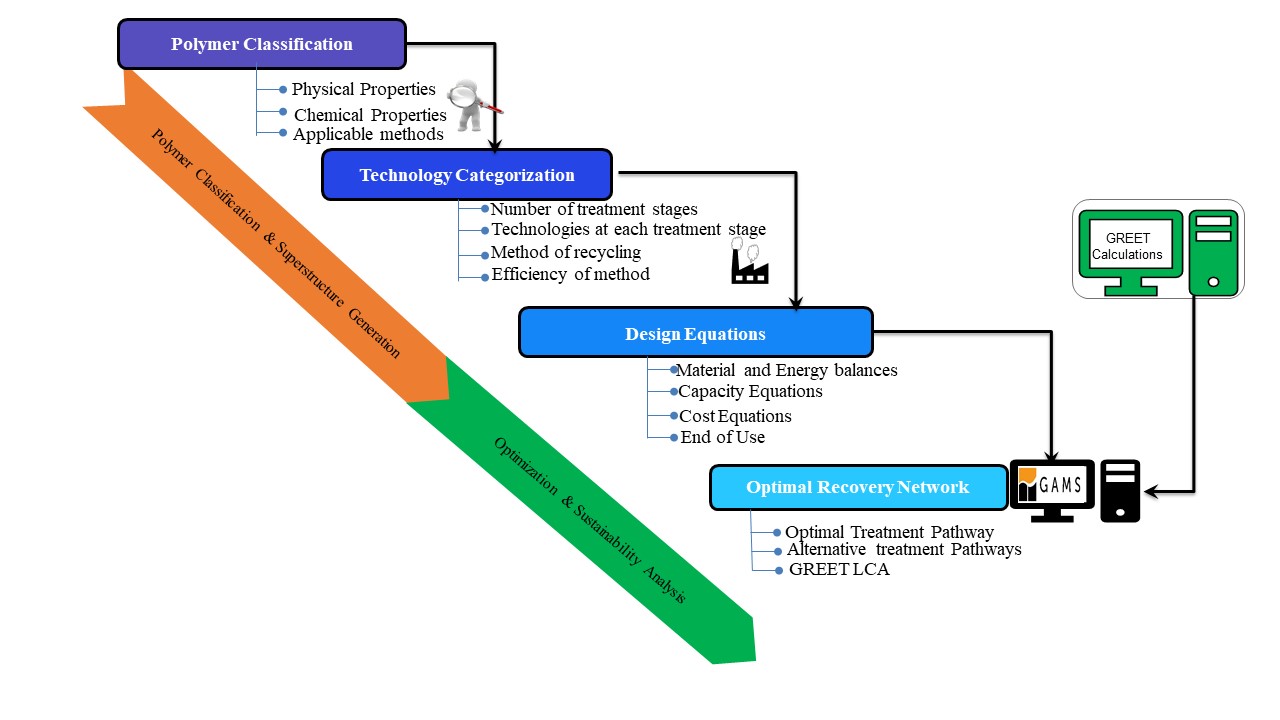(662c) Analysis of Solvent-Assisted Chemical Recycling of Plastics Using a Superstructure Optimization Approach
AIChE Annual Meeting
2022
2022 Annual Meeting
Environmental Division
Waste Plastic - Recycle, Reuse and Remediation Strategies II
Thursday, November 17, 2022 - 4:06pm to 4:24pm
In 2018, the United States generated over 35.7 million tons of plastic waste with only 8.4% recycling rate. The other 91.6% was either incinerated or disposed of in a landfill (USEPA, 2020). By the year 2050 global plastic production is predicted to triple (Tiseo, 2020). Mechanical recycling is the most common recycling method but presents with lower value recycled materials . Chemical recycling presents a promising alternative as it potentially allows for plastics to maintain their original properties (Rahimi and García, 2017). Economic concerns have been the only consideration made regarding the implementation of chemical recycling, however there is the need to incorporate environmental impact assessment for a holistic evaluation. To that end, there is the need to investigate existing and novel feasible chemical recycling technologies to help mitigate the challenging problem posed by plastics end-of-life stage at a cheaper cost, and environmentally friendly. This simultaneous consideration of the technology selection, economics, and environmental burden of plastic recycling presents a multi-objective optimization problem.
Methodology
Thus, we present a conceptual solvent-assisted plastics recycling framework based on a superstructure optimization approach (Chea et al., 2020). Our approach compares different technologies that perform similar tasks based on driving forces, efficiencies, and feed properties. Four crucial stages in this recycling process are implemented into a superstructure: (i) impurity removal, (ii) recovery, (iii) purification, and (iv) refinement. Mathematical models for each technology are developed in terms of mass/energy balances, equipment design and costing and the complete superstructure optimization is formulated as a mixed-integer nonlinear programming (MINLP) problem and solved in General Algebraic Modeling Systems (GAMS) platform. The optimal pathway for the recovery of plastics is then assessed for environmental impacts using the Green-house gas, Regulated Emissions, and Energy use in Technologies (GREET) model (US DOE, 2021.; Wang et al., 2020). In this analysis, the impacts from the upstream processes such as solvent synthesis as well as the recovery process itself are considered. A Life Cycle Inventory (LCI) is developed and calculated for each process and the Life Cycle Assessment (LCA) is a summation of the individual LCIs that make up the process (Laurent et al., 2014).
To test the validity of our framework a case study for the solvent-assisted recycling of poly (ethylene terephthalate) (PET) (Sherwood, 2020) was analyzed. Our framework can simultaneously quantify the cost and the potential emissions of the process with a PET recovery of up to 80% and solvent recovery of 90%. Incorporating solvent recovery into solvent-assisted plastic recycling systems is necessary to make them economically feasible in comparison to traditional mechanical recycling methods.
References
Chea, J.D., Lehr, A.L., Stengel, J.P., Savelski, M.J., Slater, C.S., Yenkie, K.M., 2020. Evaluation of Solvent Recovery Options for Economic Feasibility through a Superstructure-Based Optimization Framework. Ind. Eng. Chem. Res. 59, 5931–5944. https://doi.org/10.1021/acs.iecr.9b06725
Laurent, A., Bakas, I., Clavreul, J., Bernstad, A., Niero, M., Gentil, E., Hauschild, M.Z., Christensen, T.H., 2014. Review of LCA studies of solid waste management systems–Part I: Lessons learned and perspectives. Waste management 34, 573–588.
Rahimi, A., GarcÃa, J.M., 2017. Chemical recycling of waste plastics for new materials production. Nature Reviews Chemistry 1, 1–11. https://doi.org/10.1038/s41570-017-0046
Sherwood, J., 2020. Closed-Loop Recycling of Polymers Using Solvents : Remaking plastics for a circular economy [WWW Document]. https://doi.org/info:doi/10.1595/205651319X15574756736831
Tiseo, I., 2020. Topic: Global plastic waste [WWW Document]. Statista. URL https://www.statista.com/topics/5401/global-plastic-waste/ (accessed 12.19.20).
US DOE, n.d. Argonne GREET Model [WWW Document]. URL https://greet.es.anl.gov/ (accessed 10.19.21).
USEPA, 2020. Advancing Sustainable Materials Management: 2018 Tables and Figures 84.
Wang, M., Elgowainy, A., Lee, U., Bafana, A., Benavides, P.T., Burnham, A., Cai, H., Dai, Q., Gracida-Alvarez, U.R., Hawkins, T.R., Jaquez, P.V., Kelly, J.C., Kwon, H., Lu, Z., Liu, X., Ou, L., Sun, P., Winjobi, O., Xu, H., Yoo, E., Zaimes, G.G., Zang, G., 2020. Summary of Expansions and Updates in GREET® 2020 (No. ANL/ESD-20/9). Argonne National Lab. (ANL), Argonne, IL (United States). https://doi.org/10.2172/1671788
